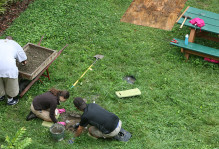Lessons Learned in Haiti
July 13, 2011
1 Comment
[reposted from haiticompact.blogspot.com]
Since the Haiti Compact’s exploratory trip in June 2010, I have developed a post-Alternative Break practice: after every alternative break I go on, I compile a list of things I’ve learned. This way, when I get back and people say “How was your trip?,” I have something more substantial to respond than, “Um, it was great!” Summing up an AB experience can be difficult, and sharing what you learn is one way to do it while extending the knowledge to others.
Here’s my list from this year’s Haiti Compact trip:
- Haiti is recovering, physically. There is much less rubble than a year ago, and very few signs that the earthquake has happened. (Frequently we discussed what was the effect of the earthquake and what was the effect of long-term poverty.)
- Still, true recovery, or health in a holistic way, is a long way off. Tent camps still exist, and were being destroyed while we were there – but people living there had nowhere else to go. Poverty, unemployment are still very widespread. Much of this was the case before the earthquake, and has been heightened because of the earthquake. People have hopes for their new President, Martelly, but it’s unclear how long the honeymoon will last. The announcement of Martelly’s pick for the new Prime Minister – Daniel Rouzier (since rejected by Parliament) – led to widespread disappointment and upset.
- People are going about their daily business, showing resilience. There is also recognition by health workers with whom we spoke that there is a great need for mental health care to address post-trauma issues.
- Relationships are important above all, and returning to Haiti year after year not only builds relationships but builds credibility. We as US Americans must value relationships because we have something to learn from Haitians.
- Basic infrastructure (electricity, water) is very hard to come by in areas even just outside cities. We saw this in Cap Haitien and in an area just outside Port-au-Prince. The expense, difficulty of access, and most of all the lack of political will to make it happen, are all prohibitive.
- Education is deeply important, and accessible only to the luckiest/most wealthy. Lack of access = lack of opportunity.
I continue to process what I learned in Haiti even today, 32 days after returning. We invite your thoughts and comments in the continued conversation and will look forward to adding to our posts as we recruit our new team members and get back in full-time planning mode in the Fall!
Categories: Community Engagement & Service, Faculty & Staff Blogs
1 Comment
Comments are currently closed. Comments are closed on all posts older than one year, and for those in our archive.




Spot on, Melody.